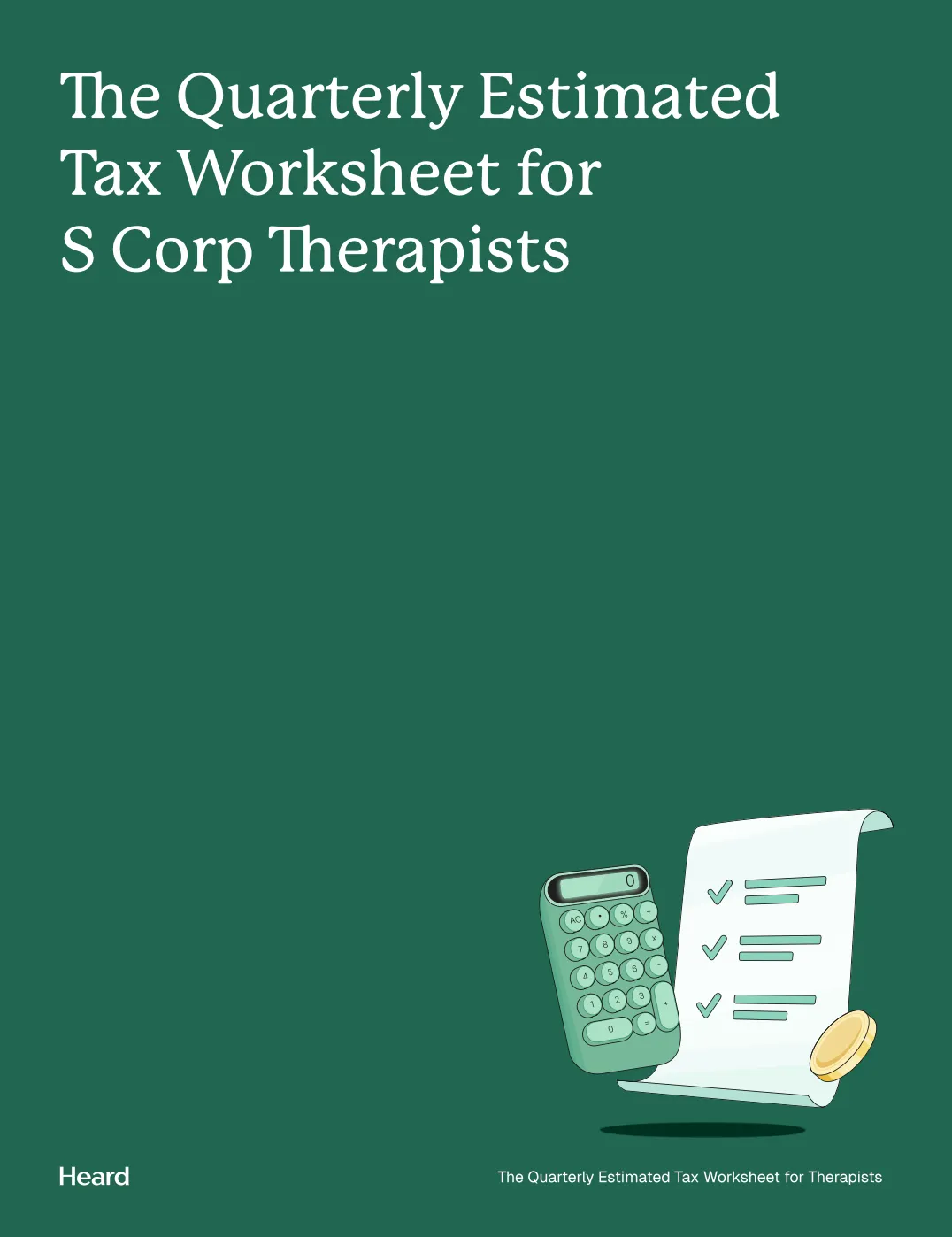Does an S corporation (S corp) have to pay quarterly estimated taxes?
Absolutely. If your therapy practice is taxed as an S corp and owes over $1,000 in federal taxes for the year, you must prepare and file on a quarterly basis.
Now, the good news: if you’ve already filed quarterly taxes for a sole proprietorship, you already know the drill. Estimated tax installments for your S corp aren’t much different, save a few caveats along the way.
What are quarterly estimated taxes?
The IRS requires you to pay income tax on all income you earn. When you’re an employee, your employer withholds a portion of your income and remits it to the IRS. When you’re self-employed, you pay the taxes you owe on all income you earn.
If you’re self-employed and you owe $1,000 or more in federal taxes, the IRS requires you to pay in quarterly estimated installments for the current year.
Meaning, since the year is 2026, you must pay taxes on what you expect to owe for the year 2026 in scheduled, quarterly installments. That can be tricky if you’re not sure how much money you expect to make over the course of the year. More on that later.
Quarterly estimated taxes for S corporations
If you’re like most therapists who elect S corporation status for their practices, you are your own employee.
That is, your S corporation pays you a salary, and may also pay you disbursements as a shareholder. When your S corporation pays you, it withholds federal income tax, FICA, and any taxes required by the state where you operate.
But, provided your practice earns enough profit to owe $1,000 or more in federal taxes, you still need to pay in quarterly installments. Check out our guide to income tax brackets for therapists.
The amount you must pay depends on how much of your S corp you own. If you own 100% of it, you must pay 100% of its income tax. If you own 50%, you must pay 50%—and so on.
Does that mean you’re double taxed?
At first glance, it may seem you’re paying income twice: first, on your S corp’s total earnings; and again, on the money your S corp pays you as salary (in the form of withholdings).
However, when you calculate and file your S corp’s net income, you deduct all salaries and wages, including your own. The quarterly estimated tax installments you pay are based on the total amount your business owes after deductions. You’re only paying income tax once for each type of income (your personal salary, and your S corp’s profits).
{{resource}}
How do you get out of paying quarterly taxes?
Every individual (or pass-through entity, which includes S corps) owing $1,000 or more in federal taxes for the year may pay quarterly estimated taxes.
However, if you own an S corp, you don’t have to pay quarterly taxes if all of the following apply:
- You did not owe any taxes the year prior, and were not required to submit a tax return
- You were a US citizen for all 12 months of said year
- Your tax year was 12 months in duration
Penalties for underpaying or overpaying quarterly estimated taxes for your S corporation
The IRS is not without mercy. They recognize that it can be difficult calculating exactly how much your business will earn over the course of the year, and the penalties for underpaying or overpaying are not severe.
If you pay too little, the IRS will charge interest on the outstanding amount. The IRS charges interest on all late payments. If you pay less than required, the IRS considers the outstanding amount a late payment.
If you pay too much, you’ll get it back as a refund.
A tax refund doesn’t sound like much of a penalty. In fact, getting a check in the mail may seem like a windfall.
But any extra money you pay the IRS, even if it’s refunded, is your money. And the IRS doesn’t pay interest on any extra cash of yours they happen to hold on to.
So, if you pay the IRS $1,000 more than you owe in taxes for the year, you’ll get that $1,000 eventually. In the meantime, you could have used that money to pay down debt, reinvest in your business, or simply kept it as a cushion in case of emergency.
When you calculate quarterly estimated tax payments for your S corp therapy practice, it benefits you to be as accurate as possible.
{{resource}}
How to estimate quarterly taxes for your S corporation
S corp therapy practices that use Heard don’t need to worry about estimating their quarterly taxes. We create quarterly tax estimates for you, and help to make sure you pay them on time.
But if you don’t use Heard, you have two options for calculating your quarterly tax payments while avoiding IRS penalties: with a financial projection, or with the safe harbor rule.
Estimating quarterly tax payments with a financial projection
By calculating how much you expect to make over the course of the year, you can produce an accurate estimate and avoid IRS penalties.
This works best if your income is stable and recurring, such as when you have a fixed list of clients you see week to week, month to month, with little change.
Alternatively, if you find your income fluctuates considerably one month to the next, you may be better off with a different approach. For instance, if your income one month is $1,500, and the next month it’s $4,000—and this degree of fluctuation is not unusual for you—then you may have a difficult time making an accurate projection.
To create a financial projection, take several (at least three) typical months’ income and calculate the average amount you earned each month. Then multiply that amount by twelve to project your earnings for the entire year.
Now, divide that amount by four to calculate how much you must pay each quarter.
Estimating quarterly tax payments using the safe harbor rule
Instead of creating a financial projection for the year in question, you can opt to simply pay the same amount in taxes that you paid the year prior.
By using the previous year’s income to plan your payment, you take advantage of the safe harbor rule. In short, so long as you pay 100% of what you paid the previous year, the IRS won’t penalize you for underpayment.
Keep in mind that, if you underpay, you’ll still be required to make up the difference; you’ll just do so without incurring penalties.
Heads up, though: If this is your first year paying taxes as an S corp, and your first year as an employee of your own practice, you could end up significantly overpaying your taxes if you use the safe harbor rule. That’s because the deduction of your salary from your practice’s revenue has the potential to lower your S corp’s overall taxable income.
{{resource}}
Quarterly tax deadlines for S corp therapy practices
The 2026 quarterly tax deadlines for S corp therapy practices are:
- April 15, 2026: Deadline for Q1 estimated tax payments
- June 15, 2026: Deadline for Q2 estimated tax payments
- September 15, 2026: Deadline for Q3 estimated tax payments
- January 15, 2027: Deadline for Q4 estimated tax payments
Note that tax payments carry into the next year. So, on January 15, 2027 you’ll pay estimated taxes for the fourth quarter of 2026.
Keep in mind that your S corp’s annual tax filing (Form 1120S) has a different deadline than your personal tax filing.
S corp tax returns are due March 15th, or the next business day after if the 15th falls on the weekend or a national holiday. Personal returns are due on April 15th. Check out our guide to tax deadlines for therapists for more info.
How to pay quarterly estimated taxes for your S corporation online
For maximum security, pay online using a bank card following these step-by-step instructions.
—
New to running an S corporation and still learning the ropes? Check out our complete guide to S corporations for therapists.
This post is to be used for informational purposes only and does not constitute legal, business, or tax advice. Each person should consult their own attorney, business advisor, or tax advisor with respect to matters referenced in this post.
Bryce Warnes is a West Coast writer specializing in small business finances.
{{cta}}
Manage your bookkeeping, taxes, and payroll—all in one place.

Discover more. Get our newsletter.
Get free articles, guides, and tools developed by our experts to help you understand and manage your private practice finances.





